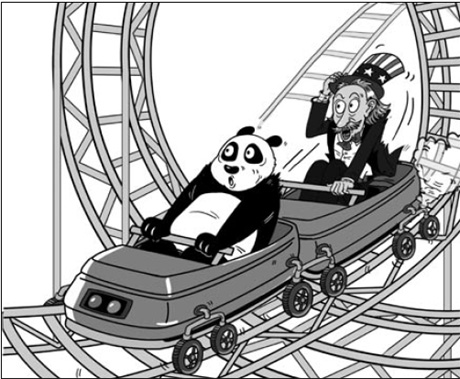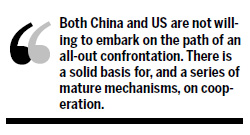View
Future China-US ties bright and stable, despite rocky roads
By Jin Canrong (China Daily)
Updated: 2010-07-30 18:23
 |
Large Medium Small |

The Sino-US relationship has been tumultuous since the end of last year. From December to February, the bilateral ties that were strengthened last year were hurt by a series of issues including disputes over climate, trade, Google, arms sales to Taiwan and US President Barack Obama's meeting the Dalai Lama.
People were surprised by the quick and many changes on the US sides.

For example, China and the US had a brief argument on the issues of Iran's nuclear program and the yuan's exchange rates, but they eventually settled the problems with mutual compromises.
Both China and US are not willing to embark on the path of an all-out confrontation. There is a solid basis for, and a series of mature mechanisms, on cooperation. As the negative influences of the financial crisis persist, the countries need to work together on many issues at present and in the future. As such, we can see the two sides showing restraint in the diplomatic rows.
The US sales of weapons to Taiwan, the presidential meetings with the Dalai Lama and the trade disputes have been three chronic irritants in the bilateral relations, while the Google and climate issues popped up only recently.

However, they've have affected part, not the whole, of Sino-US relations. Following their political logics, the two countries will all express their own stance and defend their interests. Their inevitable problems and differences will be controllable if the two sides stick to the principle of moderation in their dealings.
I believe Sino-US relations may pick up later this year, despite a rocky start. Although the mid-term election in the US in November may affect President Obama's policy on China, the impact will be limited as domestic problems will be core issues of mid-term elections.
In general, Sino-US relations during the Obama administration may follow phases from a good start to fluctuations to stabilizing.
Steady bilateral relations between China and the US are vital both to China's continued growth and a peaceful and prosperous world. People need to pay special attention to the following factors important to Sino-US ties.
First, the development of China has exceeded the expectations of both Chinese and Americans and it has challenged the two sides to readjust their perspectives. China and the US must get used to the shift as soon as possible and make necessary changes to how they think and behave. This will be a difficult process for both sides.
Second, the West has initiated the globalization wave. However, for the past 10 years, its biggest beneficiaries seem to have been emerging economies, including the BRIC countries - Brazil, Russia, India and China - and the VISTA countries - Vietnam, Indonesia, South Africa, Turkey and Argentina.
By comparison, developed countries have benefited less from globalization. Therefore, anti-globalization campaigns tend to spread in some Western countries. We need to understand further how such global changes will affect Sino-US ties.
Third, isolationism seems to be picking up while US dominance is in decline. There are also uncertainties in the structure of leadership in the world. Chaos and anarchism may appear in some regions. All these will bring new challenges to the prospects of the Sino-US relationship.
Fourth, while Japan adopts a "return to Asia" policy, the integration of eastern Asian economies may accelerate. At the same time, the US will pay more attention to Asia and the Pacific.
Of course, there are also other factors that will affect bilateral ties. As the needs for further cooperation become bigger and communication mechanisms further develop, I believe that future Sino-US relations will be stable, after the two sides readjust themselves to the new realities and take proactive steps to tackle the challenges.
The author is a professor and vice-dean of the School of International Studies at Renmin University of China in Beijing.